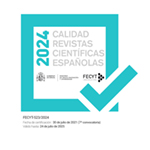Las Casas de las Mujeres Indígenas y Afromexicanas en el norte de México ante la Cuarta Transformación y la pandemia global
Resumen
En este artículo, reflexionamos sobre las estrategias, respuestas y límites que enfrentan las CAMIA (Casas de las Mujeres Indígenas y Afromexicanas del norte de México) en su lucha contra la violencia de género y la defensa de sus derechos, en el marco de la Cuarta Transformación y la pandemia global. Visibilizo que las mujeres indígenas de esta organización construyen sus agendas de género situando sus demandas en sus propias gramáticas culturales, contemplando que su lucha contra la violencia que las afecta (la cual se incrementó con la pandemia) no puede desvincularse de los derechos colectivos de las comunidades a las que pertenecen. Las CAMIA vernacularizan los discursos de los derechos de género como una herramienta importante para extraer mayores concesiones al Estado mexicano, abriendo los debates sobre los órdenes de género, el acceso a la justicia y las políticas sobre equidad e igualdad. Esta resemantización y disputa por la defensa de sus derechos muestra los avances de la actual situación política mexicana, pero a la vez, las fuertes tensiones y desencuentros entre las organizaciones de mujeres indígenas y el gobierno central.
Descargas
Descarga artículo
Licencia
La Revista Española de Antropología Americana, para fomentar el intercambio global del conocimiento, facilita el acceso sin restricciones a sus contenidos desde el momento de su publicación en la presente edición electrónica, y por eso es una revista de acceso abierto. Los originales publicados en esta revista son propiedad de la Universidad Complutense de Madrid y es obligatorio citar su procedencia en cualquier reproducción total o parcial. Todos los contenidos se distribuyen bajo una licencia de uso y distribución Creative Commons Reconocimiento 4.0 (CC BY 4.0). Esta circunstancia ha de hacerse constar expresamente de esta forma cuando sea necesario. Puede consultar la versión informativa y el texto legal de la licencia.









